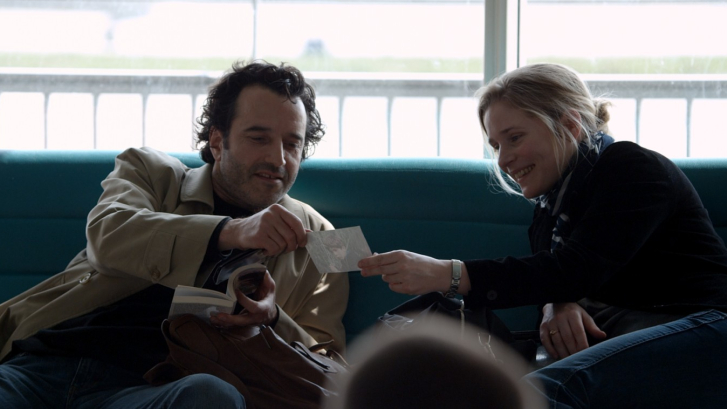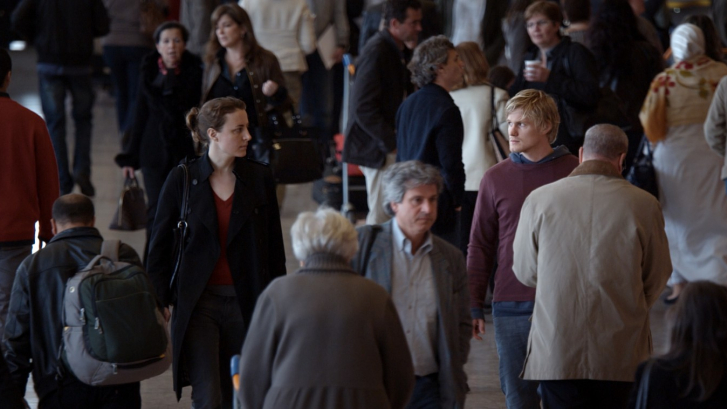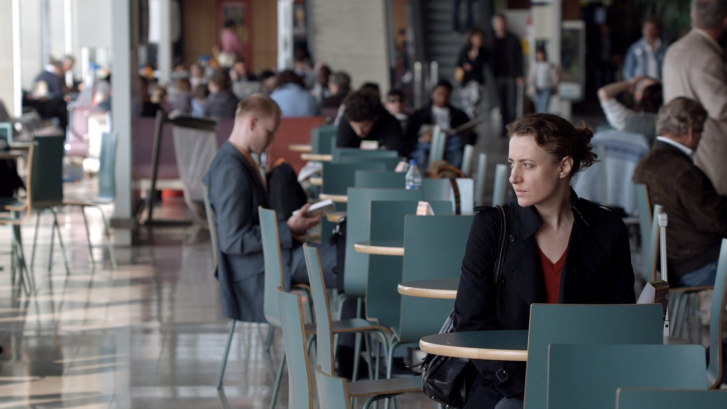Orly

Winter’s end, travelers are waiting in Paris airport Orly. A woman, who accidentally left her wedding ring at her mother’s, falls in love with a stranger. A young man lost his love in the much too close relationship that he has with his girlfriend (Lina Falkner), and discovers the woman of his dreams. At the cusp of adulthood, a beautiful youth is traveling with his mother. For the son, it’s time to speak plainly. He tells her the story of him and his friend being at the river when it started to rain. They sought shelter in a boat house. »Then, we looked at each other. And then we fucked.« Their flight is called and they go to board. The mother doesn’t know what to say. He protectively puts his arm around her. People in transit, so occupied by their immediate fate that they are oblivious to threat until the airport is evacuated.
Loosely-linked scenes in the hall of Parisʼ Orly airport. [...] The departure hall is a place of transit. People are between the here and there, between the “not yet” and the “no more”. Schanelec places four couples amid the crowds of waiting passengers; the camera observes them, often from a distance. But their conversations can be heard; the ear is closer than the eye. Intimate islands of dialogue amid hectic activity. The tremendous background noise does them no harm until the music comes and infects the whole room. Cat Power sings “Remember Me”, reinforcing the atmosphere of longing, separation and transitoriness that already lingers in the air. Later, the off-screen monologue of a dying, loving man adds to it. “Love Will Tear Us Apart” – thatʼs whatʼs written at the beginning on a record cover. A farewell film.
Birgit Kohler
“Our life consists of the ephemeral”
What gave you the idea for this film?
Reinhold Vorschneider, the film’s cameraman, and I were in Paris for the release of MARSEILLE, waiting for the return flight to Berlin. We were sitting in the restaurant we later shot the movie in. It is very beautiful, in a big hall flooded with light. Everything is expansive and transparent, and people have their place in it. I began wondering what stories it might have. What made me decide to shoot there was that this room was made for the people in it. It doesn’t put them in question, and so they are beautiful, or at least tolerable. My feeling was that everything was possible, nothing wrong. I also had a longstanding interest in urban spaces that, though anonymous, tie people together.
The film has four strands, the personal stories of couples. Some strands seem to touch. How did you develop the individual strands while writing the script?
I wrote one after the other. At first they had no points of contact. The original idea was that the room and the simultaneity of events was connection enough. I was worried that anything more would be at the expense of the unintentionality and randomness I wanted. But quite the contrary: in a later phase of writing, the few points of contact that arose between them seemed to intensify the atmosphere of ephemerality.
After PLÄTZE IN STÄDTEN (PLACES IN CITIES) and MARSEILLE, ORLY, too, is set in France. What fascinates you about this country and especially about working with a foreign language?
With PLÄTZE IN STÄDTEN, Paris was simply the city outside of Germany that I know best, and then one thing led to another – experiences I had, the foreignness that persists despite my tenacious overtures to the city. I’m sure it’s also the beauty of the city, which is hard for me to pin down. I also really wanted to work with French actors again. Because of the costs, for a long time it wasn’t clear whether we would be able to shoot in Orly, and while writing I kept thinking that other airports could do as well, like Amsterdam or Zurich; that wouldn’t change the story. But in the end I was relieved that I didn’t have to look for another airport. People are constantly shooting films in Orly, incidentally. I really just got in line, which had a calming effect.
Does using a different language alter the story?
In what way? If I had shot the film in Germany, I would have told the same stories. But there is often an idiotic side effect: efforts to make oneself understood take a different course when made in your own language. If I speak French with the French actors during the work, I have no choice but to use every word I can think of. Normally I don’t regard that as particularly productive. But I made myself vulnerable, the way you are at my mercy now, too. Rehearsals reminded me of when I was in theater, when I still thought it made sense to discuss characters and situations. I haven’t thought that in a long time. But here talking was simple, not phony; it was useful and pleasing.
The atmosphere of the airport, a public space, dominates the soundtrack. The movie focuses on the individual characters, as if in passing. A song clearly breaks through this atmosphere, like a musical theme. What led to this aesthetic decision?
When I viewed the first long shots of Jirka and Maren walking through the hall, I already thought of a song by Cat Power, and from then on I couldn’t imagine the scene any other way. But then the song seemed too flat and finally I chose another Cat Power song. When I see the scene now, it seems very naïve to use music this way; but at the same time it is exactly what I wanted. I think the music makes the ephemerality of Maren and Jirka’s encounter more conspicuous; it shows that things are fleeting and exist nonetheless. Our lives consist of the ephemeral. That’s a bit sad, but actually interesting and revealing. Incidentally, while mixing the sound, our aim was to make the public space as present as possible and to embed the actors’ voices to keep them a part of the whole thing. The focus in the sound had to correspond with the focus in the picture. But the space is still just as important; it is the starting point, trigger, and body of the whole and is always felt.
In your films, you always seem to ask the question of the focus of the characters: Who stands how and when in the picture? And what is more important in a certain moment: the view of the surroundings or of the character? The young man’s playing with the camera also seems to pose this question. What is he focusing on and what effect does that have? Do you determine the details of the images beforehand, or do you improvise while shooting?
In regard to Jirka, very early I asked myself how we would deal with his being the only character whose subjective view I want to narrate. During preparations with Reinhold, we kept getting stuck at this passage in the script. But because the spaces keep changing with the people’s movements, it became clear to us – to Reinhold earlier than to me – that our method of breaking down the scenes while in preparation would not take us very far. So we gave that up and only decided where we wanted to shoot which scenes. These stays at the airport – often several days at a time, months before we began shooting, always among all those people – triggered in me something fatalistic, a feeling of helplessness. Sometimes that was liberating, but sometimes it really got me down. On the days when we filmed, we just looked at how the situation in the respective place was, where the actors could find their places, and the positions of the two cameras was decided accordingly. All you can do is respond to everything else.
What was shooting in the airport like? Do we see extras, or did you film on an ordinary day?
We shot on ordinary days and didn’t rope off the space, as I had originally planned. We only had the actors and those who played the police and security personnel, because we weren’t actually permitted to film the officers on duty. We used extras for passengers only in the evacuation scene. I could never have made this film with extras. I hate and fear extras and am completely incapable of directing them. I even tense up when assistants start staging them. It’s frightening to be surrounded on the set by people who are always nodding,
even though they don’t understand anything, and who then destroy whole takes, as if by remote control. My interest in ORLY was precisely the people who move there. In regard to the actors’ acting, they were the measure of all things, so to speak, and thus irreplaceable. I met with Lina, who plays Jirka’s girlfriend, at the beginning of our work at Tegel Airport; I asked her to simply sit down with her suitcase and read a book. But the woman two meters away, who was also merely reading a book, looked much different: more absorbed, more beautiful. It was very easy to see what the goal and point was. It’s hard for an actor to be absorbed, or at least to seem so. But he can; that’s his profession. I wouldn’t even dream of expecting an extra to do it.
All of the characters in ORLY are busy with their personal problems and life situations. They are all connected with the “external world” solely through cell phones, camera pictures, and in one case a letter. It seems as if waiting in an airport puts them all in an exceptional state. What interested you about this situation, which is familiar to us all?
Probably the lack of resistance that arises because they let themselves be directed, this surrender to rules, this obliviousness I spoke of, this slight weariness. The equanimity and softness that develops when one accepts that one has to wait. The immutability of waiting, of life. The remarkable trust in people we don’t know, in procedures we can’t influence. The yearning for something different that every traveler has, the hope. The present tense of flying. The solitude, the closeness of the sky.
Interview: Gabriela Seidel-Hollaender, Berlin, January 2010
details
-
Runtime
84 min -
Country
Germany, France -
Year of Presentation
2010 -
Year of Production
2010 -
Director
Angela Schanelec -
Cast
Natacha Régnier, Bruno Todeschini, Mireille Perrier, Emile Berling, Jirka Zett, Lina Phyllis Falkner, Maren Eggert, Josse de Pauw -
Production Company
Ringel Filmproduktion, Berlin; Nachmittagfilm, Berlin; La Vie Est Belle, Paris; ZDF/3sat, Mainz -
Berlinale Section
Forum -
Berlinale Category
Feature Film
pictures from the movie
Biography Angela Schanelec
Angela Schanelec, born on 14 February 1962 in Aalen, studied acting at the University of Music and Performing Arts in Frankfurt am Main from 1982 to 1984. Immediately afterwards she made her debut as a film actress with a leading role in Christian Ziewer's historical film "The Death of the White Horse" (1985). Apart from this performance, however, Schanelec concentrated on stage work: until 1991 she appeared as an actress at the Thalia Theater Hamburg, the Schauspielhaus Cologne, the Berlin Schaubühne and the Schauspielhaus Bochum.
In 1990 she began studying directing at the German Film and Television Academy Berlin (dffb), which she completed five years later. Her graduation film "Das Glück meiner Schwester", in which she herself plays a leading role, was awarded the German Film Critics' Prize for "Best Film" in 1996. Schanelecs second film "Places in Cities" premiered in 1998 at the Cannes Film Festival in the section "Un Certain Regard". The following year she received the Berlin Art Prize (Förderungspreis Film- und Medienkunst). With her subsequent films "Mein langsames Leben" (2001), "Marseille" (2004; Film Critics' Award for Best Screenplay) and "Nachmittag" (2005), which were characterized by their emphatically calm and sober staging and an undisguised naturalism, Schanelec advanced to become one of the first protagonists of the so-called "Berlin School" - a style to which filmmakers Thomas Arslan, Christoph Hochhäusler, Benjamin Heisenberg and Maren Ade are also ascribed.
In 2010 Angela Schanelec, who is also responsible for the screenplay of all her films, presented her sixth feature-length film in the Forum of the Berlinale: "Orly" tells the story of a number of very different people whose lives cross at the Paris Orly Airport. At the Festival of German Film in Ludwigshafen, the work was awarded the Film Art Prize.
In 2012, Schanelec was appointed professor for narrative film at the Hamburg Academy of Fine Arts. In 2014, for the omnibus film "Ponts de Sarajevo", she belonged to the group of 13 European directors who in individual episodes dealt with the role of Sarajevo in European history.
Two years later, in August 2016, Angela Schanelec presented her seventh feature-length film: In the idiosyncratic and poetic "Der Traumhafte Weg" (DE/GB/GR), she tells the story of two couples whose paths cross unexpectedly in Berlin, oscillating between the Greece of 1984 and Berlin 2014. The film was released regularly in April 2017 and won the German Film Critics' Award for Best Editing (Angela Schanelec, Maja Tennstedt) and Best Camera (Reinhold Vorschneider).
Schanlec's next film, the drama "Ich war zuhause, aber", celebrated its world premiere in the Competition of the Berlinale 2019.
-filmportal.de

